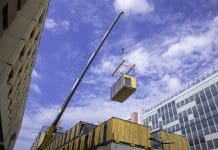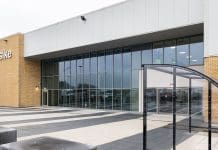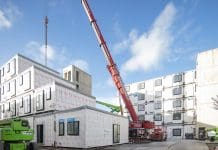Recent reports show that NHS waiting lists are at a record high, with more than five million people still awaiting non-urgent surgical treatment. Alan Wilson at ModuleCo explains how modular construction is well suited to efficiently expanding NHS capacity
This has provoked an outcry from the Royal College of Surgeons in England who are calling for a “new deal for surgery”.
The proposed solution centres around so-called surgical hubs that can be added to existing hospital sites and remain as infection-free zones should there be further disruption from Covid-19, another pandemic or severe winter flu pressures in the future.
Turning to innovative solutions
Throughout the pandemic there have been several examples of hospitals demonstrating how modular construction is well suited to quickly and efficiently expanding NHS capacity.
These facilities further reinforce the need for key decision-makers throughout the sector to research and embrace innovative alternatives to traditional construction methods, helping to quickly solve NHS capacity issues caused by the pandemic and typical ongoing hospital pressures.
Covid-19 has shown the unpredictability of the world around us and demonstrated the need for our health service to be resilient enough to respond to evolving demand – as quickly as possible. There are several options available to Trusts looking for a cost and time-effective way of increasing NHS capacity to treat more patients and enhance overall service levels.
Mobile facilities have been hailed as ticking both cost and time boxes, but modular and Modern Methods of Construction (MMC) are increasingly considered as a viable solution to rising capacity challenges, particularly in reference to the recent call for surgery hubs.

Modular vs. Mobile solutions
Both modular and mobile healthcare facilities have been used in the past to quickly increase hospital capacity in a more cost-effective way than a traditional build method.
The two approaches can be implemented within short time frames and are patient-ready in considerably less time than traditional construction counterparts.
Mobile facilities can be a good solution for short-term challenges. Modular alternatives, however, offer a longer-term facility that will allow the healthcare provider to forecast capacity with greater accuracy, knowing they have access to a permanent, high-quality healthcare facility.
Modular facilities are developed to be HBN and HTM compliant and can be designed with vital client input to ensure the facility is fully fit for purpose. Mobile solutions, on the other hand, may compromise some of these guidelines and are not always suitable for certain procedure types or meet the specific needs of a client.
Attractive delivery timeframes
Without question, a major benefit of both modular and mobile healthcare facilities is that they can be on-site and operational significantly quicker than a traditional build.
Mobile options can be made operational in days and sit externally to the existing hospital building, making them a rapid way of adding extra capacity and treating more patients.
Conversely, modular facilities have a longer delivery time frame (most are made patient ready within around 12 weeks), but as these are developed with design input from the users, they can be connected to existing structures to become part of the hospital building, therefore, offering a more long-term or permanent addition to the hospital estate.
Many NHS hospitals have opted for a mobile solution in the past as they can be delivered quickly and relatively easily relocated between sites within a Trust estate. However, the structural design of mobile units which are often trailer-mounted makes them unsuitable for some types of procedures, typically those which require a vibration-free floor as with some types of ophthalmic surgery and some procedures involving lasers.
By comparison, a modular facility requires extensive site preparation to ensure the robust support of the building and the floor structure can be designed in conjunction with site foundations to provide a range of floor loadings.
Cost as a primary consideration
As we’re aware, the cost challenges currently faced by the NHS are significant. The £5bn injection of funds that was allocated to support them through the Covid-19 response is unlikely to be renewed once the immediate threat of the pandemic is perceived to be over.
With this in mind, key decision-makers will be hoping to cut costs where possible, often meaning that only so-called ‘essential’ works will go ahead. These often include exclusively ‘emergency’ works at hospital sites and doesn’t extend to the upgrading or replacement of ageing equipment.
More often than not, cost is the main motivation for opting for a non-traditional solution. Speedy delivery times mean that mobile healthcare facilities come with the caveat that they are expensive to hire. These units also come staffed with a theatre manager as well as onboard medical gases; all of which contributes to overall costs.
On the other hand, modular facilities can be made available via a flexible hire agreement whereby the costs of the entire facility (including the initial groundworks, design and equipment) are amalgamated into one monthly cost, allowing for accurate economic forecasting for the overall hire term of the facility.
At ModuleCo Healthcare, we also provide the option of a ‘Managed Service Agreement’, which combines the costs of the day-to-day running of the facility (including Hard and Soft FM) which ensures the ongoing maintenance of the building.
Both mobile and modular solutions eradicate the need for the NHS Trust in question to find significant amounts of upfront capital to pay for the project in its entirety, but decisions should be well-informed and taken with caution around what is most cost-effective in the long run.
Making the right decision
It’s vital to have the buy-in of those healthcare professionals who will be using the space on a day-to-day basis. When developing a new modular facility, it’s the surgeons, theatre staff, nurses and patients who remain front of mind to ensure that our facility satisfies their needs.
In our experience, overall satisfaction with a modular facility is considerably higher compared to perceptions of the mobile alternative. Our modular solutions are sometimes brought in to replace mobile facilities that have fast become a drain on hospital resource because of unsustainable, high monthly rental costs for what was originally hired by the Trust for short term use.
Any NHS Trust looking for a time and cost-effective solution to permanently expand their capacity should carefully consider their options from both a financial and practical viewpoint, researching reliable providers and considering feedback from the people who will be using the space itself.
It’s probably time for key decision-makers to start embracing these alternative solutions and recognising them as both a time and cost-effective way of solving capacity-related issues.
Modular solutions offer viable, short to long term options for healthcare providers looking to add high specification, bespoke facilities to their hospital estate, with the added benefit that monthly payments can align to both the budget and timeframe requirements of the NHS Trust in question.
Alan Wilson
Managing director














